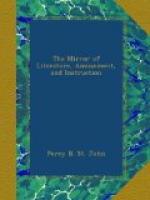THE MIRROR OF LITERATURE, AMUSEMENT, AND INSTRUCTION.
No. 469.] Saturday January 1, 1831 [price 2d.
* * * * *
[Illustration: Copied from one of the prints of last year’s Landscape Annual, from a drawing, by Prout. This proves what we said of the imperishable interest of the Engravings of the L.A.]
* * * * *
Petrarch and Arqua; Ariosto, Tasso, and Ferrara;—how delightfully are these names and sites linked in the fervour of Italian poetry. Lord Byron halted at these consecrated spots, in his “Pilgrimage” through the land of song:—
There is a tomb in Arqua;—rear’d
in air,
Pillar’d in their sarcophagus,
repose
The bones of Laura’s
lover: here repair
Many familiar with his well-sung
woes,
The pilgrims of his genius.
He arose
To raise a language, and his
land reclaim
From the dull yoke of her
barbaric foes:
Watering the tree which bears
his lady’s name
With his melodious tears, he gave himself
to fame.
They keep his dust in Arqua,
where he died;
The mountain-village where
his latter days
Went down the vale of years;
and ’tis their pride—
An honest pride—and
let it be their praise,
To offer to the passing stranger’s
gaze
His mansion and his sepulchre;
both plain
And venerably simple; such
as raise
A feeling more accordant with
his strain
Than if a pyramid form’d his monumental
fane.
And the soft quiet hamlet
where he dwelt
Is one of that complexion
which seems made
For those who their mortality
have felt,
And sought a refuge from their
hopes decay’d
In the deep umbrage of a green
hill’s shade,
Which shows a distant prospect
far away
Of busy cities, now in vain
display’d,
For they can lure no further;
and the ray
Of a bright sun can make sufficient holiday,
Developing the mountains,
leaves, and flowers,
And shining in the brawling
brook, where-by,
Clear as a current, glide
the sauntering hours
With a calm languor, which,
though to the eye
Idlesse it seem, hath its
morality.
If from society we learn to
live,
’Tis solitude should
teach us how to die;
It hath no flatterers, vanity
can give
No hollow aid; alone—man with
his God must strive;
Or, it may be, with demons,
who impair
The strength of better thoughts,
and seek their prey
In melancholy bosoms, such
as were
Of moody texture from their
earliest day,
And loved to dwell in darkness
and dismay,
Deeming themselves predestin’d
to a doom
Which is not of the pangs
that pass away;
Making the sun like blood,
the earth a tomb,
The tomb a hell, and hell itself a murkier
gloom.[1]




